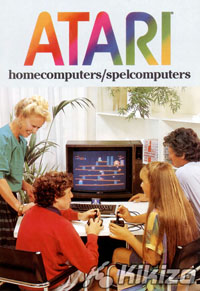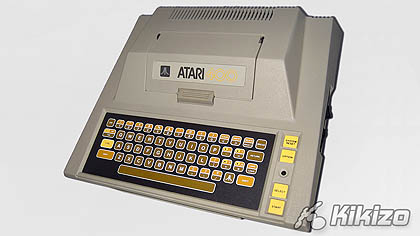Nolan Bushnell Interview
We sit down with one of the founding fathers of the games industry, creator of Pong and Atari legend Nolan Busnell, for an extensive chat about gaming past, present and future.
Page 2
Nolan forms Atari
Atari's first efforts were the arcade Pong and a hard-wired home console version of the seminal tennis game, and while those established Atari, Bushnell, Dabney and Alcorn busied themselves designing the console which was to be the Video Computer System (VCS) - retroactively named the 2600. Things proved trickier than Bushnell anticipated, however, as Atari was dogged by a perennial lack of cash (as demonstrated when he rebuffed the overtures of two obscure geeks named Steve Jobs and Steve Wozniak). Frustrated, Bushnell sold Atari to Warner Communications for $28 million in 1976. The VCS arrived in 1977 and was a smash hit, but Bushnell clashed constantly with Warner, and was forced out in 1978.
The vindication Bushnell didn't want arrived when Atari crashed in 1984; by then, he had reinvented himself by founding the Chuck E. Cheese chain of restaurants.
 | |
| Happy days: playing Atari at home | |
Bushnell: You know, it's interesting. I saw it as being a multi-million-dollar business. I didn't see it as being quite as explosive a success as it turned out to be. You know, when you're building something, you know all of the trade-offs, and I always felt that the 2600 was - in that gaming space - kind of a stepping-stone, and that maybe it would be on the market for two or three years. After I sold the company to Warner, I said: "Well, we've got to get started on the next version." And they were horrified. I think that one of the big mistakes that happened was that the 2600 was pushed too hard, too far, and there wasn't a gentle transition to the newer technology.
Kikizo: Atari had a golden period when it dominated the industry, then everything went wrong in the early to-mid 1980s, with things like the notorious ET landfill fiasco. How involved with the company were you then, and how bad a period was that for you?
Bushnell: I left the company in 1978, and I really had massive, massive disagreements with how Warner was running the company. I really saw that they were going to totally screw it up. The only thing that I was wrong about is that it took them two years longer than I thought it would.
Kikizo: What are your favourite games from your time at Atari?
Bushnell: I always loved both Breakout and Asteroids - I thought they were really good games. There was another game called Tempest that I thought was really cool, and it represented a really hard technology. It's probably one of the only colour-vector screens that was used in the computer graphics field at that time.
Kikizo: What's your biggest regret?
Bushnell: Selling Atari when I did - I think that's my biggest regret. And I probably should have gotten back heavily into the games business in the late Eighties. But I was operating under this theory at the time that the way to have an interesting life was to reinvent yourself every five or six years. So I did Chuck E Cheese and things in automobile navigation. It's made for a very interesting life, but I feel I had some core skill-sets in the games business that I sort of allowed to lie fallow.
Kikizo: Can you tell us about what happened when Steve Jobs and Steve Wozniak approached, wanting you to turn their computer designs into a product, and you turned them down?
Bushnell: You've got to understand that Atari was very underfunded all the way along - the venture-capital community and financial community didn't get the fact that games were a business. We were using every bit of capital that we had just to keep up with the growth. We were internally funded and growing as fast we could, limited by our capital. So, to take on anything else that would alienate any of that capital just didn't make sense at the time. I recognised that we were going to be able to - at some point in time - get into the computer business, which we ultimately did once we had access to Warner's capital.
We had some really powerful technology - Atari always was a technology-driven company, and we were very keen on keeping the technological edge on everything. There's a whole bunch of things that we innovated. We made the first computer that did stamps or sprites, we did screen-mapping for the very first time, and a lot of stuff like that. We had some of the most sophisticated sound-creating systems, and were instrumental in MIDI.
Kikizo: Were you impressed by Jobs and Wozniak at the time?
Bushnell: The two Steves were young and excited, but I was not convinced that they were ready for the bruising business world. I introduced them to Don Valentine, who brought in Mike Markala, who provided the business skills for their first years in business. I think much of their early success was because of Mike. Jobs has grown into a truly great CEO -- if it would have happened anyway is anyone's guess.






 Satoru Iwata Video Interview - the late Nintendo president spoke with Kikizo in 2004 as 'Nintendo Revolution' loomed.
Satoru Iwata Video Interview - the late Nintendo president spoke with Kikizo in 2004 as 'Nintendo Revolution' loomed. Kaz Hirai Video Interview - the first of Kikizo's interviews with the man who went on to become global head of Sony.
Kaz Hirai Video Interview - the first of Kikizo's interviews with the man who went on to become global head of Sony. Ed Fries Video Interview - one of Xbox's founders discusses an epic journey from Excel to Xbox.
Ed Fries Video Interview - one of Xbox's founders discusses an epic journey from Excel to Xbox. Yu Suzuki, the Kikizo Interview - we spend time with one of gaming's most revered creators.
Yu Suzuki, the Kikizo Interview - we spend time with one of gaming's most revered creators. Tetris - The Making of an Icon: Alexey Pajitnov and Henk Rogers reveal the fascinating story behind Tetris
Tetris - The Making of an Icon: Alexey Pajitnov and Henk Rogers reveal the fascinating story behind Tetris Rare founders, Chris and Tim Stamper - their only interview? Genuinely 'rare' sit down with founders of the legendary studio.
Rare founders, Chris and Tim Stamper - their only interview? Genuinely 'rare' sit down with founders of the legendary studio. The History of First-Person Shooters - a retrospective, from Maze War to Modern Warfare
The History of First-Person Shooters - a retrospective, from Maze War to Modern Warfare